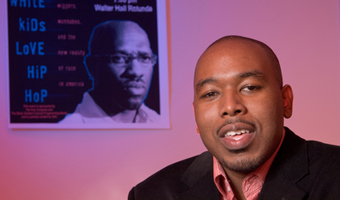The Chillicothe Gazette covered a lecture by Dr. Akil Houston, Assistant Professor of African American Studies, on Feb. 26 at the Ohio University-Chillicothe campus.
Speaking to college students and community members on Thursday, Akil Houston bypassed the better-known icons of the civil rights movement in favor of an unsung figure who he called “the blueprint” for his own pursuit of social justice.
Houston, a professor of African-American studies at Ohio University in Athens, used his opportunity as Ohio University-Chillicothe’s featured Black History Month lecturer to celebrate the contributions of Ella Baker, a civil rights activist whose work took place largely behind the scenes.
The premise of Houston’s lecture, titled “Beyond Dr. King,” was not meant to be “disrespectful of (the Rev. Dr. Martin Luther King Jr.’s) legacy, but to say that as much of a giant as he was in this particular era, there were others,” he said.
Although far from a household name, Baker was instrumental in what Houston called the “unsexy” part of activism during that era — the planning meetings and door-to-door visits…. Read the entire article in the Gazette.
“Ella Baker, although an eloquent speaker herself, was critical of the ‘charismatic leader’ style of leadership,” says Houston. “She felt too much focus on individuals rather than on actual organizing and plans would distract from the movement’s larger goals. Baker was quoted as saying, ‘My basic sense of it has always been to get people to understand that in the long run they themselves are the only protection they have against violence or injustice.’
“Despite her role as a teacher and mentor for which she was called Fundi, a Sawhili word for expert teacher (mentor), Baker is often not acknowledged as the backbone of the movement,” Houston says. “Ella Baker is largely responsible for the leadership of many key human rights organizations from the SCLC (Southern Christian Leadership Conference), where she served as acting executive director to her work with the NAACP and the mentoring and development of youth who would become SNCC (Student Nonviolent Coordinating Committee). However, because she was critical of the long-term value of marches and the lack of inclusion of women and the poor as not just participants but as active agents in the movement, she was often at odds with many of the established leaders of the movement.”
Houston is an Ohio University alum, having earned a Ph.D. in Cultural Studies in Education, M.F.A. in Film Production, and M.A. in International Studies from OHIO.

















Comments